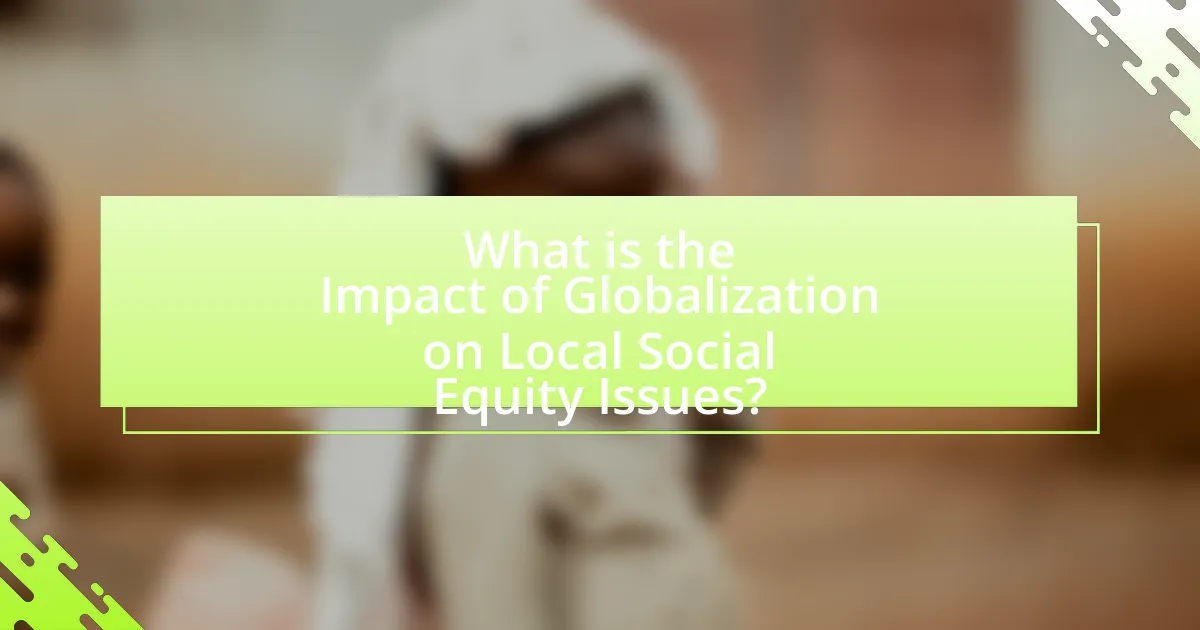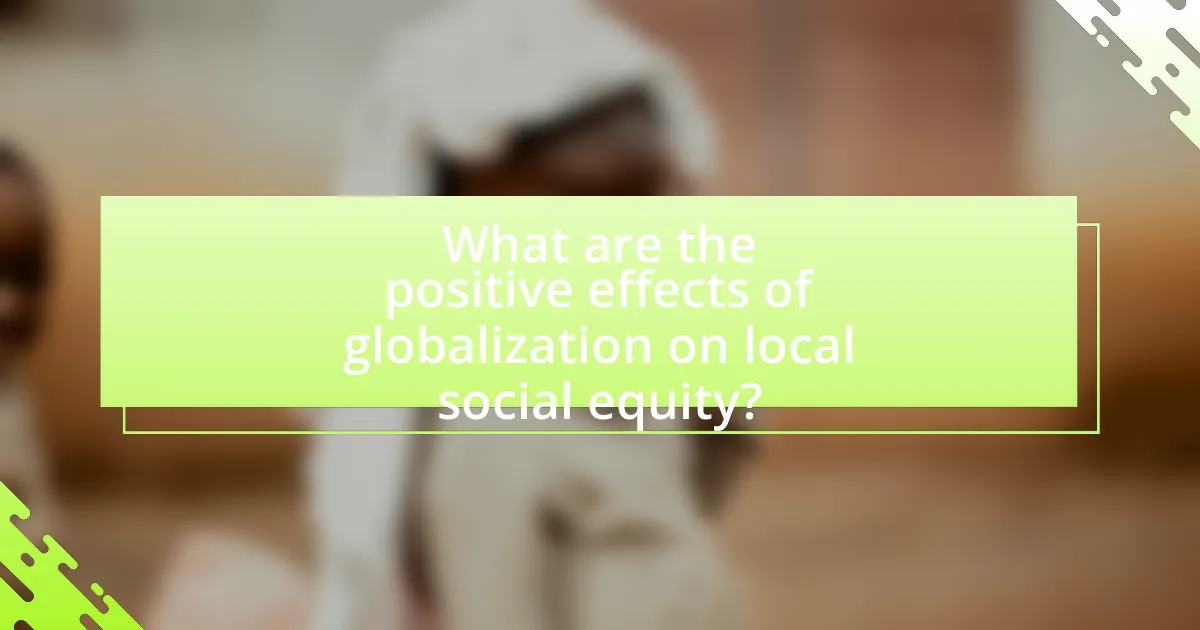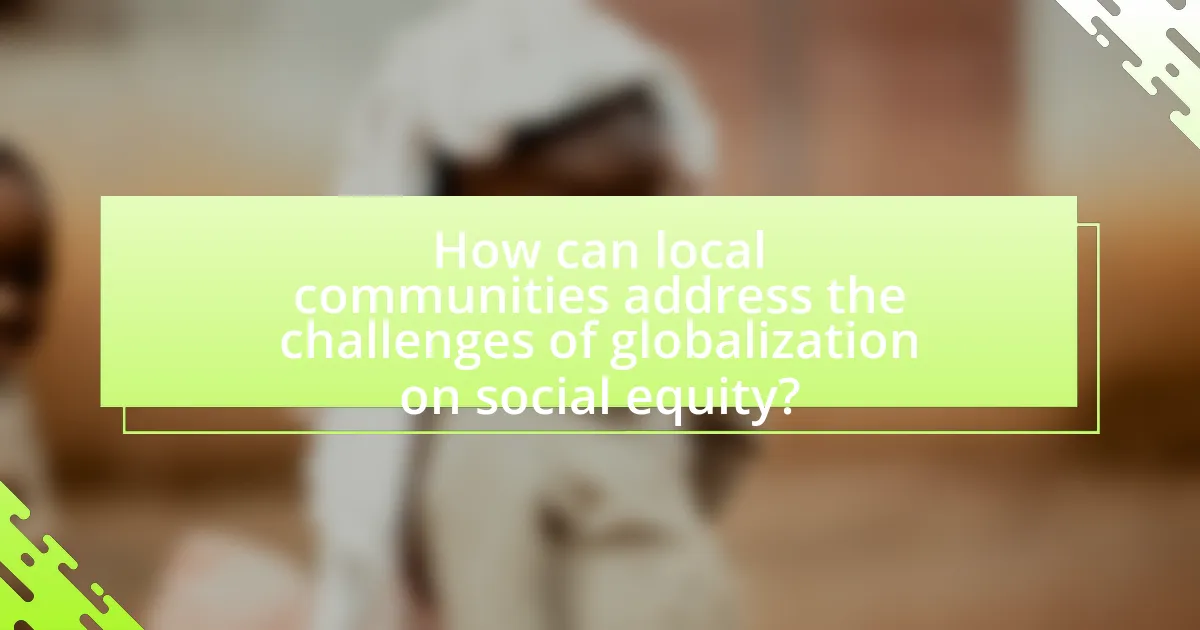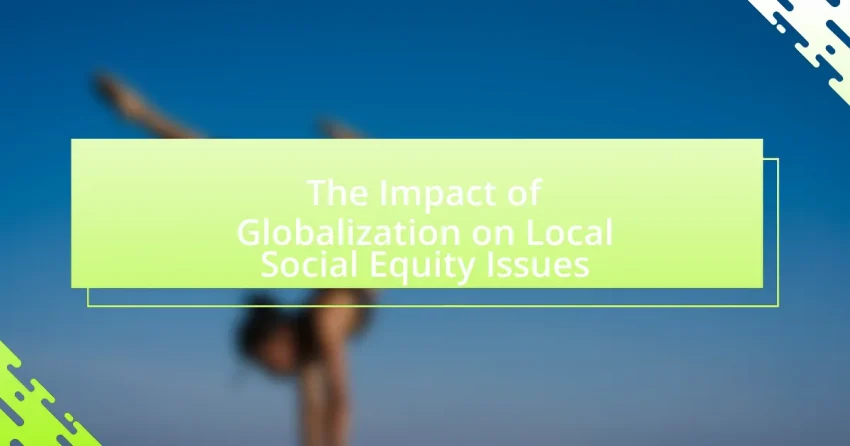The article examines the impact of globalization on local social equity issues, highlighting how it exacerbates income inequality and marginalizes vulnerable populations. It discusses the dual nature of globalization, which can create economic opportunities while simultaneously increasing disparities in wealth and access to resources. Key factors influencing social equity include economic integration, labor mobility, and cultural exchange, all of which shape the distribution of opportunities within communities. The article also addresses the importance of social equity in ensuring fair access to resources and the role of local and global entities in promoting inclusive policies to mitigate the negative effects of globalization.

What is the Impact of Globalization on Local Social Equity Issues?
Globalization significantly impacts local social equity issues by exacerbating income inequality and marginalizing vulnerable populations. As global markets expand, wealth tends to concentrate among those with access to resources and opportunities, often leaving low-income communities and marginalized groups behind. For instance, a report by the International Labour Organization in 2021 indicated that globalization has led to a widening gap in income distribution, with the richest 10% of the population capturing a disproportionate share of economic growth. This trend undermines social equity by limiting access to education, healthcare, and employment opportunities for disadvantaged groups, thereby perpetuating cycles of poverty and inequality.
How does globalization influence social equity in local communities?
Globalization influences social equity in local communities by increasing economic opportunities while simultaneously exacerbating inequalities. As global markets expand, local businesses may benefit from access to larger consumer bases, leading to job creation and economic growth. However, this growth often favors those with existing resources and skills, leaving marginalized groups at a disadvantage. For instance, a study by the International Labour Organization found that globalization can lead to wage disparities, where skilled workers see significant income increases while unskilled workers face stagnation or decline in wages. Additionally, globalization can result in the erosion of local cultures and social structures, further marginalizing vulnerable populations. Thus, while globalization can drive economic development, it also poses challenges to achieving social equity within local communities.
What are the key factors of globalization affecting local social equity?
The key factors of globalization affecting local social equity include economic integration, labor mobility, and cultural exchange. Economic integration often leads to increased competition, which can exacerbate income inequality within local communities as wealth becomes concentrated among those who can adapt to global markets. Labor mobility allows for the migration of workers seeking better opportunities, but it can also result in a brain drain, where skilled individuals leave their local economies, further diminishing local equity. Cultural exchange can lead to the erosion of local identities and traditions, impacting social cohesion and equity among different community groups. These factors collectively influence the distribution of resources and opportunities, shaping the landscape of social equity in local contexts.
How do economic changes from globalization impact social equity?
Economic changes from globalization often exacerbate social equity disparities by increasing income inequality and limiting access to resources for marginalized groups. For instance, while globalization can lead to economic growth and job creation in certain sectors, it frequently benefits skilled workers and capital owners disproportionately, leaving low-skilled workers vulnerable to job displacement and wage stagnation. According to a report by the International Labour Organization, globalization has contributed to a widening income gap, with the richest 10% of the global population capturing a significant share of wealth, while the poorest remain marginalized. This dynamic undermines social equity by perpetuating cycles of poverty and limiting opportunities for upward mobility among disadvantaged communities.
Why is social equity important in the context of globalization?
Social equity is important in the context of globalization because it ensures that the benefits of global economic integration are distributed fairly among all segments of society. As globalization increases interconnectedness, disparities in wealth and opportunity can widen, leading to social unrest and instability. For instance, the World Bank reports that income inequality has risen in many countries due to globalization, highlighting the need for policies that promote equitable access to resources and opportunities. By prioritizing social equity, societies can foster inclusive growth, enhance social cohesion, and mitigate the negative impacts of globalization on marginalized communities.
What are the definitions and dimensions of social equity?
Social equity is defined as the fair and just distribution of resources, opportunities, and privileges within a society, ensuring that all individuals have access to the same rights and benefits regardless of their background. The dimensions of social equity typically include access, participation, and outcome equity. Access equity refers to the availability of resources and opportunities to all individuals; participation equity emphasizes the involvement of diverse groups in decision-making processes; and outcome equity focuses on achieving fair results for all, particularly marginalized communities. These dimensions highlight the multifaceted nature of social equity and its importance in addressing disparities exacerbated by globalization.
How does social equity relate to economic development in a globalized world?
Social equity is crucial to economic development in a globalized world as it ensures that all individuals have equal access to opportunities, resources, and benefits of economic growth. When social equity is prioritized, marginalized groups can participate fully in the economy, leading to a more inclusive workforce and increased productivity. For instance, research by the World Bank indicates that reducing income inequality can boost economic growth, as equitable access to education and employment enhances human capital. Furthermore, countries that invest in social equity often experience greater social stability, which is essential for sustainable economic development in a globalized context.

What are the positive effects of globalization on local social equity?
Globalization positively affects local social equity by increasing access to resources, opportunities, and markets for marginalized communities. This phenomenon enables local businesses to engage in international trade, leading to economic growth and job creation, which can reduce income inequality. For instance, a study by the World Bank found that countries that embraced globalization experienced a significant reduction in poverty rates, with an estimated 1 billion people lifted out of extreme poverty between 1990 and 2010 due to increased economic opportunities. Additionally, globalization fosters cultural exchange and awareness, promoting social inclusion and diversity, which can enhance community cohesion and support equitable policies.
How does globalization promote access to resources and opportunities?
Globalization promotes access to resources and opportunities by facilitating the flow of goods, services, and information across borders. This interconnectedness allows individuals and businesses to tap into global markets, leading to increased availability of diverse products and services. For instance, according to the World Bank, countries that engage in international trade experience higher economic growth rates, which translates to improved access to employment opportunities and resources for local populations. Additionally, globalization encourages foreign direct investment, which can enhance local infrastructure and create jobs, further expanding access to essential services and economic opportunities.
What role do international organizations play in enhancing local social equity?
International organizations play a crucial role in enhancing local social equity by providing resources, expertise, and frameworks that promote inclusive policies and practices. These organizations, such as the United Nations and World Bank, facilitate funding for social programs aimed at reducing inequality and improving access to essential services like education and healthcare. For instance, the World Bank’s initiatives in developing countries have led to significant improvements in poverty reduction and social inclusion, evidenced by a 2018 report indicating that targeted social protection programs lifted millions out of extreme poverty. Additionally, international organizations advocate for human rights and equitable governance, influencing local governments to adopt policies that address disparities and empower marginalized communities.
How can globalization lead to improved education and healthcare access?
Globalization can lead to improved education and healthcare access by facilitating the exchange of knowledge, resources, and best practices across borders. This exchange allows countries to adopt successful educational models and healthcare innovations from others, enhancing their own systems. For instance, international collaborations and partnerships can result in increased funding and investment in local education and healthcare infrastructure. According to a report by the World Bank, countries that engage in globalization often experience a rise in educational attainment and health outcomes due to access to global funding and expertise. Furthermore, globalization promotes the sharing of technology and information, which can improve the quality and accessibility of education and healthcare services, particularly in underserved regions.
What are the challenges posed by globalization to local social equity?
Globalization poses significant challenges to local social equity by exacerbating income inequality and marginalizing vulnerable populations. As global markets expand, wealth tends to concentrate among a small elite, leading to disparities in income distribution. For instance, the World Bank reported that the richest 10% of the global population owns over 70% of the world’s wealth, while the poorest half holds less than 2%. This concentration of wealth undermines local economies and limits access to essential services for lower-income groups. Additionally, globalization can lead to the erosion of local cultures and labor standards, as multinational corporations often prioritize profit over equitable labor practices, further disadvantaging local workers.
How does globalization contribute to income inequality in local contexts?
Globalization contributes to income inequality in local contexts by facilitating the concentration of wealth among a small elite while marginalizing lower-income groups. This occurs as multinational corporations often exploit cheaper labor markets, leading to job displacement in local industries and wage suppression for workers. For instance, a study by the International Labour Organization in 2019 found that globalization has led to a significant increase in income disparity, with the top 10% of earners capturing a disproportionate share of economic growth compared to the bottom 50%. Additionally, globalization can result in the erosion of local labor standards and social protections, further exacerbating income inequality.
What are the social and cultural impacts of globalization on marginalized communities?
Globalization significantly affects marginalized communities by exacerbating social inequalities and altering cultural identities. As global markets expand, marginalized groups often face economic displacement due to competition from larger corporations, leading to job losses and reduced access to resources. For instance, in many developing countries, local artisans struggle to compete with mass-produced goods, resulting in the erosion of traditional crafts and livelihoods.
Culturally, globalization can lead to the homogenization of cultural practices, where dominant cultures overshadow local traditions. This phenomenon is evident in the widespread adoption of Western consumer culture, which can diminish the cultural heritage of marginalized communities. Research indicates that this cultural shift can result in identity crises and loss of community cohesion, as seen in Indigenous populations facing pressures to conform to mainstream societal norms.
Moreover, globalization can also provide opportunities for marginalized communities to connect with global networks, potentially leading to social empowerment and advocacy. However, the benefits are often unevenly distributed, reinforcing existing power dynamics. Overall, while globalization presents both challenges and opportunities, its social and cultural impacts on marginalized communities tend to favor the continuation of inequities.

How can local communities address the challenges of globalization on social equity?
Local communities can address the challenges of globalization on social equity by implementing inclusive policies that promote equitable access to resources and opportunities. For instance, community-led initiatives can focus on supporting local businesses, which helps retain economic benefits within the community and reduces dependency on global supply chains. Research indicates that regions prioritizing local economic development see a 20% increase in job creation compared to those that do not. Additionally, fostering partnerships between local governments, non-profits, and community organizations can enhance social safety nets, ensuring marginalized groups receive necessary support. Evidence from the International Labour Organization shows that inclusive labor policies can reduce income inequality by up to 10%. By actively engaging in these strategies, local communities can effectively mitigate the adverse effects of globalization on social equity.
What strategies can be implemented to mitigate negative impacts?
To mitigate negative impacts of globalization on local social equity issues, strategies such as implementing fair trade practices, enhancing local workforce training, and promoting inclusive policy-making can be employed. Fair trade practices ensure that local producers receive equitable compensation, which helps to reduce income disparities. Enhancing local workforce training equips individuals with skills necessary for higher-paying jobs, thereby improving economic mobility. Promoting inclusive policy-making involves engaging diverse community stakeholders in decision-making processes, ensuring that the needs of marginalized groups are addressed. These strategies collectively contribute to a more equitable distribution of resources and opportunities within communities affected by globalization.
How can local governments promote inclusive policies in a globalized economy?
Local governments can promote inclusive policies in a globalized economy by implementing targeted economic development programs that prioritize marginalized communities. These programs can include job training initiatives, support for local businesses, and equitable access to resources, which help to reduce disparities in employment and income. For instance, cities like Barcelona have adopted inclusive economic strategies that focus on social entrepreneurship and community engagement, resulting in improved economic outcomes for disadvantaged groups. Additionally, local governments can foster partnerships with non-profit organizations and private sectors to create inclusive policies that address the unique needs of diverse populations, ensuring that globalization benefits all community members rather than a select few.
What role do community organizations play in advocating for social equity?
Community organizations play a crucial role in advocating for social equity by mobilizing resources, raising awareness, and influencing policy changes. These organizations often serve as a voice for marginalized communities, addressing systemic inequalities and promoting inclusive practices. For instance, studies have shown that community organizations can effectively engage in grassroots campaigns that lead to legislative reforms, such as the 2010 Affordable Care Act, which expanded healthcare access for low-income populations. Additionally, they provide essential services and support networks that empower individuals to advocate for their rights, thereby fostering a more equitable society.
What best practices can enhance social equity in the face of globalization?
Best practices that can enhance social equity in the face of globalization include implementing inclusive economic policies, promoting fair trade, and ensuring access to education and healthcare. Inclusive economic policies, such as progressive taxation and social safety nets, help redistribute wealth and reduce inequality. Fair trade initiatives ensure that producers in developing countries receive fair compensation, fostering economic stability and community development. Access to education and healthcare empowers marginalized populations, enabling them to participate fully in the global economy. According to the World Bank, countries that invest in education and health see significant improvements in economic growth and social equity, demonstrating the effectiveness of these practices.
How can collaboration between local and global entities improve social equity?
Collaboration between local and global entities can improve social equity by leveraging resources, knowledge, and networks to address systemic inequalities. Local entities often possess a deep understanding of community needs, while global entities can provide funding, expertise, and innovative solutions. For instance, partnerships between local governments and international NGOs have led to successful initiatives in education and healthcare, reducing disparities in access and quality. A notable example is the collaboration between the World Bank and local governments in various countries, which has resulted in targeted programs that uplift marginalized communities, demonstrating that such alliances can effectively bridge gaps in social equity.
What are effective community engagement strategies for promoting social equity?
Effective community engagement strategies for promoting social equity include participatory budgeting, community-led initiatives, and inclusive decision-making processes. Participatory budgeting allows community members to directly influence how public funds are allocated, ensuring that resources address the needs of marginalized groups. Community-led initiatives empower residents to identify and solve local issues, fostering ownership and accountability. Inclusive decision-making processes, which involve diverse stakeholders, ensure that all voices are heard, particularly those from underrepresented communities. Research shows that these strategies can lead to improved social outcomes, as evidenced by the success of participatory budgeting in cities like Porto Alegre, Brazil, where it significantly reduced poverty levels and improved public services.
What are the future implications of globalization on local social equity?
Globalization is likely to exacerbate local social equity issues by increasing economic disparities and marginalizing vulnerable populations. As global markets expand, wealth tends to concentrate among those with access to resources and opportunities, often leaving low-income communities behind. For instance, a report by the International Labour Organization in 2021 highlighted that globalization has led to a widening income gap, with the richest 10% of the population capturing a significant share of global wealth, while the poorest remain stagnant. This trend can undermine social cohesion and lead to increased social unrest, as marginalized groups may feel excluded from the benefits of globalization.
How might emerging trends in globalization affect social equity in the coming years?
Emerging trends in globalization are likely to exacerbate social equity disparities in the coming years. As global markets become increasingly interconnected, wealth concentration may intensify, benefiting multinational corporations while marginalizing local communities. For instance, the World Inequality Report 2022 indicates that the richest 10% of the global population owns 76% of total wealth, highlighting the growing divide. Additionally, the rise of digital economies can create job opportunities but often favors skilled workers, leaving unskilled laborers at a disadvantage. This trend may lead to increased unemployment and economic insecurity among lower-income groups, further widening the social equity gap.
What proactive measures can communities take to prepare for future challenges?
Communities can implement proactive measures such as developing comprehensive disaster preparedness plans, enhancing local infrastructure, and fostering community engagement to prepare for future challenges. Comprehensive disaster preparedness plans enable communities to respond effectively to emergencies, as evidenced by the Federal Emergency Management Agency’s (FEMA) guidelines, which emphasize the importance of planning and training. Enhancing local infrastructure, including transportation and communication systems, can mitigate the impact of globalization-related disruptions, as seen in cities that have invested in resilient infrastructure, reducing recovery times by up to 50%. Fostering community engagement through regular workshops and forums encourages collaboration and resource sharing, which has been shown to strengthen social networks and improve community resilience in the face of challenges.
